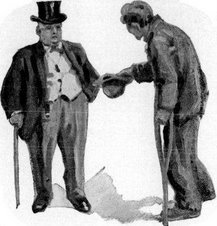Monday
Clear skies and California-like weather make Monday an unusual day in Beijing. Young women carry umbrellas for shade. Beijing is hot in the summer, cold in the winter, but this week starts with sunshine and pleasant temperatures.
The crush of numbers in Beijing is immediately obvious. Millions of people on their way to work. Packed buses, nose to tail, occupy a quarter of the road space. Taxis make up most of the rest. From my hotel room on the 18th floor I could see the frequent arrival of the elevated train bringing even more people into Beijing. There must be regulation of when delivery trucks are allowed to operate, since very few are visible.
Most of the commuters of Beijing are on their way to office or service jobs. Dress is informal, but not shabby. Neither is it stylish. About one out of 100 women wear something with real style, and some anti-style is evident in the form of flesh toned ankle socks worn to get maximum mileage out of the very flimsy-looking shoes most women are wearing. Men wear short sleeved shirts, unremarkable trousers, cheap shoes. Beijing is not about the clothes, perhaps due to the harsh climate.
Street life and food
One measure of China's emergence from ideological control over the minutia of life is the vibrant street life of a city like Beijing. Apartments are small, and life is lived out in the city. Middle aged women play cards on folding tables on the sidewalk. Emotive players bang the pieces of a Chinese chess game on boards resting on deliverymen's tricycles parked on apartment forecourts. Shirtless construction workers escape their pre-fab metal dormitories to sit in the shade of a tree on the street. There is a wide range of “normal” behavior on the street. Police do not break up the card game just because it is on a busy sidewalk.
Restaurants line the main boulevards, their shopfronts protruding from office buildings, brightly painted, festooned with lanterns. Many of the restaurants have large windows, and you can see the crowd (or lack of it) inside.
Young couples, many probably from nearby universities, and larger groups of work colleagues make up most of the crowd where I ate. The operation is large-scale, with about 200 boistrous diners seated, served by a wait staff that takes order and delivers food as it is ready, checking off their delivery against a carbon copy of the order left at the table. 600ml bottles of beer are delivered to the table in wooden totes.
Competition among restaurants must be fierce: New restaurants, closed restaurants, and restaurants under renovation are all in evidence. The ingredients and preparation at the restaurant I describe here are top quality: Green beans of the same not undercooked yet not mushy texture that really good French bistros achieve. “Streaky pork” with perfect taste, texture, and temperature throughout a thick slab of what amounts to fat fried in fat. It could have been a greasy mess, but the thin slices held together just right, and tasted something like bacon made by angels.
The food is not innovative. Everything on this menu appears on similar menus in hundreds, perhaps thousands, of other restaurants in Beijing. But, like traditional restaurants in Europe, correct execution of the local food idiom is life or death for an establishment, so quality is consistently high, even when operating at a frantic pace. For a foreigner, it's an amazing treat to experience food preparation that is so honed to perfection.
It is even more amazing to ponder the fact that the food culture and street life of Beijing have developed to the present scale only since liberalization began. Hundreds of years of tradition sprang back, ready to serve millions of meals every night, as if never interrupted.
Scale and density
China is on a wild ride of urbanization, economic growth, liberalization, demographic shift, and international influence. Scale and density make each element of China's transformation more intense, and potentially more calamitous if it goes wrong, than anything that happens in the U.S. or Europe. Density has benefits in that Chinese cities have the critical mass for vibrant street life that is hard to achieve in the U.S. In Beijing, even far from the city center, the city is a dense mix of offices, residences, restaurants, and shops.
Density and scale are also challenges in themselves. It is remarkable that the sea of humanity sloshing around Beijing's rush hour all have workplaces to get to and jobs to do – many of them apparently office jobs, in a country that is perceived as being all about manufacturing. The fact that what are, in local terms, middle class jobs and living arrangements, have been scaled up so quickly, is an optimistic sign.
Beijing is not merely a government town. The local economy outweighs the government in a sharp contrast with Washington D.C. While there must be the Chinese equivalent of beltway bandits among the office buildings of Beijing, they are not so obvious as they are around D.C., where businesses that sell to the private-sector look out of place among the government and its numerous camp followers and outfitters.
Brown again
By Wednesday, Bejing has gone from mostly sunny and a little brown and hazy in the distance, to the typical cut-it-with-a-knife Beijing smog. It will take a heroic effort to keep the 16 days of Olympic games, a year from now, clear enough not to cement Bejing's reputation for smog. China starts up new coal-fired power plants about as often as Starbucks opens a coffee shop.
China is living through a series of inflection points, each with am amplitude five times larger than what would happen in Europe or the U.S. Thus far, China has managed the ride with impressive balance and results that are worth going to see in person.
Because the perception of China in the rest of the world is behind the times, the Olympics are likely to be quite an education for the people watching on TV. They will see amazing achievements of development, and they will see normalcy in the lives of Chinese people. Hopefully they will understand the importance of China not in terms of trade surplus or diplomacy, but in terms of hundreds of millions of people emerging into the modern world – a feat that some held was impossible, and some still deny can continue.
Sunday, August 26, 2007
Another Week in Beijing
Posted by
Zigurd
at
7:00 AM
0
comments
![]()
Labels: August, Beijing, economy, growth, people, restaurants, street life, traffic
Subscribe to:
Comments (Atom)




